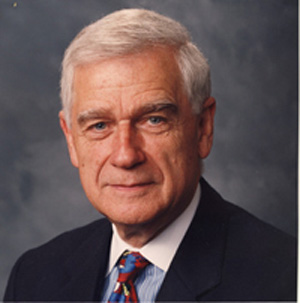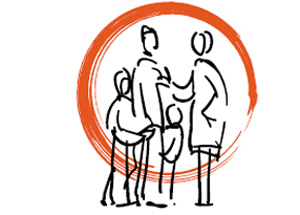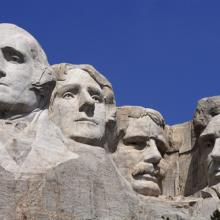Privilege
On Sunday, with lots of turkey, stuffing and pie still in the fridge, I joined the #Fast4families movement, abstaining from food and drink for a day in order to pray for immigration reform. At first, I hesitated because it wasn’t necessarily my ideal time for fasting — besides being Thanksgiving weekend, I was about to enter the last two weeks of my academic semester, the most mentally demanding and sleep-depriving time of my year.
Quickly, however, I realized that all the worries I had going into the fast came from my white, privileged, experience of the world. Because of my privilege, I could believe in the illusion that immigration reform does not affect me.
The more I thought about this, the more I concluded that my reasons for not fasting were pointing to the ugliness of my own privilege and participation in racism, for if we do not actively challenge racism, we affirm it. This is what Jesus was getting at in Matthew 12:30, when he said, “Whoever is not with me is against me, and whoever does not gather with me scatters.” Jesus does not call us to merely advocate, but asks us invest our whole lives.
My hesitancy to fast was also a reflection of Western spirituality, which privileges the mind over the body and knowledge over action. Before I knew about the fast, my inclination was to spend my day’s energy on academic work, ignoring the body I live in, as well as those bodies that suffer far more than I ever would under an oppressive immigration system.
A few weeks ago, I asked folks on Twitter, and specifically, my colleague Amy Simpson, who has recently published a book on mental illness and the mission of the church:
What do you think about the way people use words like “bipolar,” “crazy,” and “manic” when they really mean “moody,” “energetic,” “quirky” and even “fun?"
It’s part of a pattern I’ve noticed lately — and maybe you’ve noticed it too.
People with beautiful head shots, flawlessly designed websites, and enviable accomplishments insist that they are really just a ‘mess.’ Or that their families are ‘crazy.’ Or that their homes and lives are every bit as complicated and frustrating as everyone else’s … meanwhile, their Instagram feeds show nothing but beauty; if ‘chaos’ is there, it’s only ever of the picturesque kind.
There are no birdcages sprouting stalagmites and stalactites of bird droppings. There are no snotty-nosed, unwashed, half-dressed, hungry children who’ve never visited a dentist in their lives. There is food in the fridge and on the table, and it isn’t even growing mold or crawling with roaches or undulating with maggots. In fact, it’s from Trader Joe’s and may even be organic! There is no broken glass or police officers showing up because the neighbors heard screaming. There is electricity and running water and indoor toilets.
Yeah, there’s raised voices and tempers and conflicts. But that makes you human. Not crazy. Not dysfunctional. Not “a mess.”
THIS SHORT VOLUME by Jacqueline Battalora, a professor of criminal justice at St. Xavier University in Chicago, addresses a very important topic in American history and society: The legal, social, and political invention of the category of “white people” as a privileged group, which defines them as the normative Americans over against others, variously defined as “black,” “colored,” “Indians,” and “mulatto.”
When English settlers founded the New England colonies, they referred to themselves as British. As more people from other countries of Western Europe arrived in the area, they tended to group those they saw as similar to themselves as Christians, Germans, etc.—the term “white” was not used—over against “Negroes,” Indians, and rival colonizers such as the Spanish and French.
The term white was first used in colonial law after Bacon’s Rebellion in 1676, during which some African and European indentured servants formed an alliance. Virginia’s colonial leaders responded with a package of laws that created a racial caste of African-descended slaves, distinguished from European servants. These laws decreed that African slaves could not be freed and free Africans could not hold office, serve in the army, or hold European bond laborers. This group was thus disprivileged, in contrast with those of European descent who were defined as “white.”
JEREMIAH IS OUR uncomfortable and discomfiting companion this month. He is a vehemently emotional man of God. Far from struggling to bring his emotion under control, he instead prays for more raw grief and anger. He knows that even his current rage and tears in no way match the scale of devastation wreaked by unfaithfulness to God’s covenant. “For the hurt of my poor people I am hurt, I mourn, and dismay has taken hold of me. Is there no balm in Gilead? Is there no physician there? Why then has the health of my poor people not been restored? O that my head were a spring of water, and my eyes a fountain of tears, so that I might weep day and night for the slain of my poor people!” (8:21 - 9:1). To be a prophet is to risk letting our hearts resonate with the feelings of God. Jeremiah might help us discern whether our own witness for justice has turned into something too rational, measured, even routine. How do we re-engage our hearts and derive our passion from God’s divine passion?
Luke’s deep concern to show Jesus’ prophesying against the toxicity of Mammon, the power games of the wealthy, is ablaze in the gospel readings. Perhaps those who read them to us in church should preface them with a warning along the lines of Bette Davis’ famous quip in All About Eve: “Fasten your seatbelts. It’s going to be a bumpy night!”

(Yobidaba / Shutterstock)
BECAUSE I'M A Jew in Bethlehem, Pa., also known as “Christmas City USA,” I spend December celebrating Jesus’ birth. Representations of other religions are largely absent, but with evergreen trees adorning lampposts, the nativity scene at city hall, and 6-foot-high electric Advent candles, Christmas here is both beautiful and unavoidable.
Given Christianity’s dominance in the United States, similar examples extend into other seasons and across the country. Christian holidays and Sunday receive scheduling deference, Christian worship options are varied and plentiful, and debates over public “religion” focus almost entirely on Christianity. In contrast, Jews use vacation days to observe holidays, Jewish religious communities are far fewer, and there is no movement advocating Jewish prayer in schools.
Even in interreligious settings intended to be neutral, Christianity retains primacy. Exchanges emphasize concepts in Christianity, such as belief and faith, and downplay the Jewish stress on action, behavior, and ritual. When interfaith interactions turn to biblical texts, they rely on Christian hermeneutical approaches such as using English translations without acknowledgment of their underlying Hebrew and eschewing the Jewish practice of viewing the Bible through subsequent commentaries. To me, these verses look discomfortingly naked when not swaddled with sages’ centuries-old wisdom, and Christian translations often conflict with how I understand the original language.
While the consequences of social privilege are alarming for numerous reasons, we are reminded that such systematic inequalities are by no means unique to the current day and age. For example, during Jesus’ ministry he encountered a predominant culture that distributed a wide variety of elite benefits based upon gender, class, ethnicity, and other forms of false favoritism. However, one of the primary distinctions of Jesus’ life, which he continually modeled for his disciples, was a prophetic confrontation with unjust structures of social privilege.
As Jesus accompanied women, tax collectors, lepers, prostitutes, and others firmly placed on the underprivileged margins of society, he repeatedly sought the reversal of embedded discrimination and disadvantage. In doing so, not only did Jesus promote Good News of eternal life for after death, but he sought to “let the oppressed go free” (Luke 4:18) for the fullness of life after birth.
While Jesus continually endorsed the revolution of unjust social privilege, and although he taught his followers to do likewise in his name, the harsh reality is that privilege based on prejudice is profitable, which makes it difficult – if not impossible – for those in power to surrender voluntarily
If you are reading this and are from North America — and perhaps even if you aren't — you are no doubt aware of just how divisive the issue of climate change is in the US and Canada. Experts from both sides of the issue are regular installments on the 24-hour news networks, presenting the latest data in favor of or disputing the warming of the planet. Policy experts offer the pros and cons of legislation aimed at cutting greenhouse gas emissions. Law makers debate possible action steps. Facebook posts supporting or refuting climate change turn into hotbeds of political (and sometimes a little bit of personal) attacks. Friends bicker; family relationships are strained.
This is simply the reality of the political climate in North America, but the existence of such rigorous debate is no coincidence. If warming trends continue the way that scientists are currently projecting (four degrees celsius by the end of the century), things in North America won't look all that different. We'll probably experience more droughts, our growing zones will shift, and Michigan will have the climate of Tennessee. Even if things do get bad in North America, we have the money and technology necessary to adapt fairly well to any changes in weather patterns or growing seasons that we might experience. In short: North America can afford not to worry about climate change — at least for a while.
When Frederick Douglas assembled with other representatives at the National Colored Convention of 1853, they collectively condemned the nationwide epidemic of racial discrimination. As the gathering intended to discuss the circumstances and possibilities of “coloreds” (as they were called then), they recognized the various ways that “scorn and contempt” were heaped upon them — for no justifiable reason — by the white-skinned racial majority.
In remembrance of Douglas’ critique surrounding his 19th century “white countrymen,” and in recognition of our annual celebration of Black History Month, we in the U.S. continue to mourn the deep divisions that occur due to racial misunderstanding. In other words, as we take an inventory of race relations roughly 195 years after Frederick Douglas was born, we recognize that racial ignorance among far too many of our citizens continues to result in a disturbing level of collective indifference and social inequality.
The Wild Goose Festival was awesome as expected this weekend in Corvalis, Ore. About 1,000 folks gathered for the first-ever west coast version of the event started in North Carolina. There were artists, theologians, pastors, hippies, activists, poets, and any number of other curious observers, navigating the landscape to better understand where this movement might be headed.
I offered a workshop on Saturday with Brian Ammons and Bruce Reyes Chow on masculinity and male identity. Folks gathered in the small animal arena on the fairgrounds where the event was held to hear about, and respond to, male identity from three fairly distinct perspectives. It was a rich conversation and pretty fun, at least until one question came toward the end, from a guy in the back row.
I suppose we should have seen it coming, but we had gotten a little too comfortable. The following is a paraphrase of what he said, but the essence is the same.
The Psychological Toll Of War (OPINION); Mike Huckabee: 2012 GOP Candidates Must Stop Trying To 'Shred Each Other'; Obama And Cameron Must Strike A Balance Over Afghanistan Withdrawal; Syria Laying Landmines Along Border: Human Rights Watch; Have We Gone From A Mancession To A Shecovery? Not Quite. The Spectacular Triumph Of Working Women Around The World; The Reproduction Of Privilege; Obama Warns Opponents Against 'Using Religion As A Bludgeon In Politics'; Can Progressives Ride The Occupy Train To Congress?; Defining The Occupy Movement: It's Not Just About The Money (OPINION); Where Have You Gone, Mister Rogers?
Arches of the Quad at Stanford University. Image via Wiki Commons http://commons.wikimedia.org/wiki/File:Stanford_University_arc
Earlier this week, I wrote about how nostalgia expressed in contemporary politics points to the privilege of those longing for the “good old days.” In doing so, I stumbled onto a theme I’ve decided to explore throughout the week. Namely, I’m interested in how it is that inspired vision – unconstrained by “what ifs” or fear of change – might break down barriers to opportunity and help overcome systemic privilege that holds some people back from realizing the same potential as others who are more fortunate.
I wrote an article a little while back about the lingering effects of colonial power on institutional education, and how it continues to limit access for those without certain privilege to connect with it. Well, it turns out there are some folks already trying to do something about this, and it’s pretty exciting.
Sebastian Thrun, a professor at Stanford in computer science, worked recently with Google to create a revolutionary self-driving car. As if this wasn’t enough, Thrun went on to develop an idea that would at once shift the educational landscape across the planet.

Atari gaming demo center, circa 1980. Image via http://www.wylio.com/credits/Flickr/4734206265
Author Melissa Harris-Perry recently appeared on “The Colbert Report” to speak about her new book, Sister Citizen, which examines a number of stereotypes of African-American women. As he often does, Colbert teed up a common conservative talking point about “going back to he good old days.” Perry’s response kept ringing in my head for days afterward.
She said that there is no time in American history you would want to go back to as a black girl.
The point is simple but compelling. Those in the position of privilege to write history are the ones whose story is most prominently told. So when we talk about going back to some better time, it’s with the lens of that same privilege that we’re looking back.
The fact is that, unless you’re a white, Christian, straight male, there’s little to look back to and say, “Yeah, I was better off back then.”
We're sorely missing the servant leadership of America's CEOs on matters of corporate taxation.
As Congress contemplates trillions in budget cuts that will worsen poverty and undermine the quality of life in America, consider these findings from a new report that I co-authored, "Massive CEO Rewards for Tax Dodging," by the Institute for Policy Studies.
Last year, the compensation of 25 CEOs at major profitable U.S. companies was larger than the entire amount their company paid in U.S. corporate taxes.
These 25 include the CEOs of Verizon, Boeing, Honeywell, General Electric, International Paper, Prudential, eBay, Bank of New York Mellon, Ford, Motorola, Qwest Communications, Dow Chemical, and Stanley Black and Decker.
Earlier this summer I attended a church service where the pastor, a man struggling with what appears to be his final bout with cancer, preached about the hope that Jesus promises to those who trust in him. After describing the returning Jesus brandishing a sword and dripping with the blood of all our vanquished enemies, he invited the audience to share what they saw as the hope that this Jesus promises. The responses ranged from no cancer, to no pain, to no worries about paying the bills, to the promise of an upgraded body -- all of course in heaven someday after we die. The congregation was encouraged to find contentment in the present from the possibility of realizing these promises someday. Our souls are what matter; the body just has to endure until our souls reach heaven. No mention of help with how to pay this month's rent or what it means for a cancer-ridden body to be the temple of the Holy Spirit, just the spiritual promise that someday all will be well.
 Mark O. Hatfield's political witness shaped a whole generation of students, teachers, pastors, and social activists in the evangelical community and beyond. The voice of Christians today who plead for social justice and peaceful alternatives to war would not have emerged with its strength and clarity in the 1970s without his leadership. His death underscores the vacuum of such spiritually rooted voices uncompromising in their commitments to peace and justice within the cacophony political rhetoric today.
Mark O. Hatfield's political witness shaped a whole generation of students, teachers, pastors, and social activists in the evangelical community and beyond. The voice of Christians today who plead for social justice and peaceful alternatives to war would not have emerged with its strength and clarity in the 1970s without his leadership. His death underscores the vacuum of such spiritually rooted voices uncompromising in their commitments to peace and justice within the cacophony political rhetoric today.
One of my life's greatest privileges and joys was to work as an assistant to Senator Mark O. Hatfield for nearly a decade, from 1968 to 1977. I saw first-hand what courageous leadership, combined with unswerving compassion and civility, looked like within the political life of that turbulent and formative era. Those experiences are shared in my book, Unexpected Destinations (Eerdmans).
There's something special about the bookends of our lifetimes. I became a first-time father seven months ago and a hospice chaplain just one month past. Growing up and growing old, especially the first and last months of our lives, can be surprisingly similar experiences.
I fed my daughter sweet potatoes for the first time last night. Introducing her to solid foods has been a treat. While we're trying our best to teach her the sign language words for "food", "more", and " all done", Robin still finds closed-mouth grumble-whines to be the best way to let us know she thinks sweet potatoes aren't all that hot. Another subtly nuanced whine might instead wonder, "You don't happen to have any more mashed banana or applesauce around, would you?" My attempt to turn the filled spoon into an acrobatic and roaring airplane met with scant success.
 Several weeks ago (right before I left for my sabbatical), I joined with six other pastors from around the country -- in partnership with Sojourners -- to draft an open letter to Congress and President Barack Obama regarding the budget and the proposals to cut certain programs that aid the poor in our country. Our hope was to invite at least 1,000 pastors to join us in signing this document.
Several weeks ago (right before I left for my sabbatical), I joined with six other pastors from around the country -- in partnership with Sojourners -- to draft an open letter to Congress and President Barack Obama regarding the budget and the proposals to cut certain programs that aid the poor in our country. Our hope was to invite at least 1,000 pastors to join us in signing this document.
As of today, we've had nearly 5,000 pastors and Christian leaders from all 50 states join us in signing this open letter, and we hope to keep adding voices and signatures. As a pastor and Christian leader will you add your voice to let our political leaders know that you stand with the poor?
Read the letter below and if you resonate with our message, please sign your name.
What is wrong with the typical photo of world leaders making decisions for their countries? The general absence of women -- at the table, in the room, and, as a result, from the agenda.







